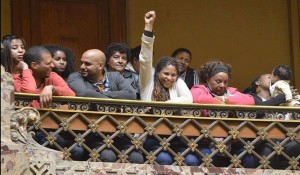As 2013 hurtles to a close, Uruguay has been receiving an avalanche of worldwide recognition. London’s The Guardian called the entire country “heroic” and said that it deserved a Nobel Peace Prize; Foreign Policy named President Mujica among its 100 Leading Global Thinkers for “redefining the Latin American Left”; and The Economist just named Uruguay its first-ever Country of the Year. As a festive top-off, buzzfeed.com published 21 Reasons everyone should move to Uruguay in 2014.
As a Uruguayan who grew up in the diaspora, accustomed to blank stares on telling people where I was from, and as an author of books about Uruguay, there is a profound whiplash that comes with this level of global attention. We Uruguayans often experience our nation, culture, and
realities as peripheral to global affairs. We are a nation of three million people sandwiched between two giants, Argentina and Brazil. We often feel invisible. How refreshing, then, to suddenly be heralded as a trailblazer for progressive change.
What’s spurring all the attention?
Its primary source is Uruguay’s groundbreaking new marijuana law. As of December 10th, this tiny nation became the first in the world to legalize the cultivation and sale of marijuana, a project which aims to combat the illicit drug trade and its accompanying scourge of social violence, providing an alternative to the failing, U.S.-led war on drugs that may well be a model for other nations in the Americas and beyond. In other words: this is not just a law about smoking pot. It’s a law about peace and safety.
There are other transformative policies that aggregate to create this potent moment in Uruguay. Among them:
• Uruguay legalized gay marriage this year, becoming the second Latin American nation to do so, and the 12th in the world. Even gay activists have been shocked at how many same-sex marriages have been officiated here since then. (My wife and I had the privilege to attend one: two loving men who’ve been together for thirty-four years. Their friends,

Two men celebrate while holding the flags of Uruguay and Argentina, the first two Latin American nations to legalize gay marriage.
neighbors, and former colleagues swarmed them with love and cheers. I should not have worn mascara.) Although homophobia certainly still exists, the social climate has been changing at a dizzying speed, thanks to the work of activists and remarkable public awareness campaigns like this one.
• Voters upheld a recent abortion law in the face of a referendum, and thereby protecting women’s health and dignity. Although the law is limited to the third trimester and places undue burdens on minors, it is still to be commended as the most liberal abortion law in Latin America.
• The Senate passed an historic, pioneering, much-needed Affirmative Action Law to ensure employment and education justice for people of African descent. This last piece has not been mentioned in any of the international press, but it’s truly historic, not least because the
measure passed by a unanimous vote, an unimaginable feat in the U.S. The law will reserve 8% of government jobs for people of African descent, who comprise 8% of the population, as well as fill the terrible void in school textbooks on the history of afrodescendientes. Racial discrimination is still a deeply entrenched, serious problem in Uruguay (perhaps this is a future post–I wrote a little about it here), and this bold, needed measure brings some crucial tools to bear in addressing it.
None of this is to suggest that there isn’t still work to be done. Uruguayan society faces many problems, including domestic violence, rising crime, stubborn poverty, and chaotic public schools. This is a nation still recovering from a brutal dictatorship that, in 1980, gave Uruguay the dubious distinction of more political prisoners per capita
than any other nation. Our current President and First Lady, the peerless and visionary José Mujica and Lucía Topolansky, were among those prisoners. That bleak history is not forgotten; it is at the root of this movement, a power source, a fuel.
Social change is a kind of alchemy. I have felt it in the air, living here in
Montevideo throughout 2013, watched it flourish. To see that same alchemy reflected in the world’s eyes gives me tremendous, exorbitant hope. The slogan of the World Social Forum springs to mind: “Another World is Possible.”
Yes, it is.
Yes, we can.
Sí se puede. Acá en Uruguay–and everywhere.






